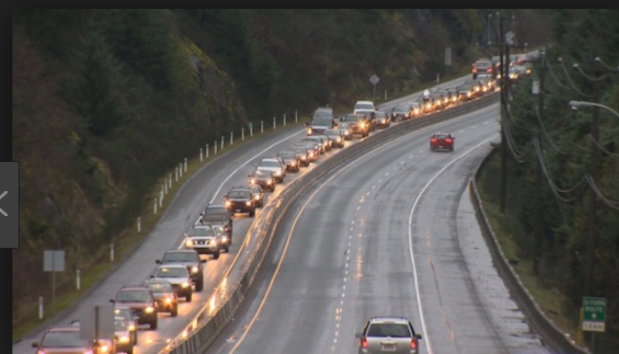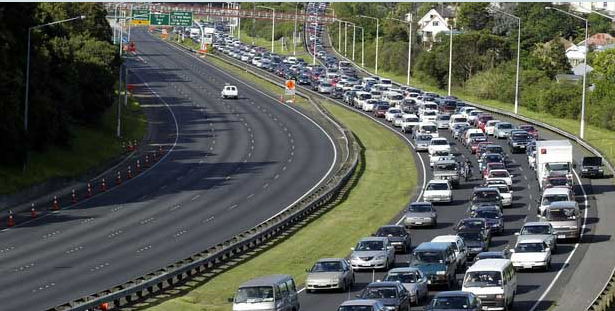
Climate crisis: UK Government unveils ‘unprecedented’ vision of future travel with focus on walking, cycling and public transport, targeting ‘net zero’ greenhouse gas emissions by 2050


Climate crisis: UK Government unveils ‘unprecedented’ vision of future travel with focus on walking, cycling and public transport, targeting ‘net zero’ greenhouse gas emissions by 2050

The Cultures of Mobility
What message could a private citizen, an engineer no less, from a small city of a country with barely two million inhabitants send to the Secretary of Transportation of the United States of America? Happily, there is more to transport and social policy than mere size. So if you decide to continue reading, I may have a modest message for you after all.
This evening, 6 February 2009, an interesting event will take place in my city. A thematic event has been organized, dedicated to the “Culture of Mobility”. In this we want to show (again) at the culture of mobility and the culture of the city are one and the same.
Maribor, my beautiful city, the second-largest in Slovenia, is to become the cultural capital of Europe in 2012. Today’s event will start with a documentary film to open up the perspectives of transportation decision-makers in the city of New York, “Contested Streets: a Mobility Tour of Four Great World Cities”. “Contested” takes its point of departure the old habit of automatically building new infrastructure for cars every time a traffic problem arose. The world-famous and world-practiced “forecast and build” culture

The Victoria Transport Policy Institute is an independent research organization dedicated to developing innovative solutions to transportation problems. The VTPI website (http://www.vtpi.org ) has many resources addressing a wide range of transport planning and policy issues. VTPI also provides consulting services.

Lunchtime Streets Chancery Lane. Tuesday 3rd – Thursday 5th September find out more below!
Lunchtime Streets is an event that removes motor traffic from a street over a lunchtime period, so people can enjoy their lunch in a safer and more pleasant environment.
Making the streets safer for people is key to both the City of London Corporation’s and the Mayor of London’s Transport Strategies.
We use this type of temporary project to measure the effects and perceptions of the local community when reducing traffic at a peak times, when most people are travelling on foot or bicycle will be key to making the streets safer. The results of the study may lead to future enhancements of the public realm.
It is also a great way to enjoy your lunchtimes. We welcome the involvement of local working, studying and residential community.

The great weakness of the local political establishment to Penang’s transport planning and policy needs is that they have insufficient technical backgrounds and competence to solve the mobility problems the people of Penang . This was made clear by the recommendations of the final Halcrow report in 2013 and nothing has been done since to improve the situation.
There are other more effective approaches to dealing with these problems with a strategy of affordable policies, measures and tools capable of giving swift results and a fraction of the costs of the proposed massive infrastructure program, the PTMP.
Let’s have a look at the Canadian report “Rethinking Malahat Solutions: Or, Why Spend a Billion Dollars if a Five-Million Dollar Solution is Better Overall?” at www.vtpi.org/malahat.pdf

This is a critical reference and tool set for World Streets readers, introducing the full contents as of 6 March 2019 of the TDM (Transportation Demand Management) Encyclopedia of the Victoria Transport Policy Institute headed by Todd Litman. All the more than one hundred resources and references cited here are available online. The full report is online at: http://www.vtpi.org/tdm/
Transportation Demand Management (TDM, also called Mobility Management) is a general term for strategies that result in more efficient use of transportation resources. This Encyclopedia is a comprehensive source of information about innovative management solutions to transportation problems. It provides detailed information on dozens of demand management strategies, plus general information on TDM planning and evaluation techniques. It is produced by the Victoria Transport Policy Institute to increase understanding and implementation of TDM.
How important is TDM for transport/mobility planners, policy makers or concerned citizens and civil society? It is very easy to answer that question, which boils down to this: If you do not have on your team first rate competence in TDM measures and references, then you are in the wrong business. TDM is the first line of defense of sustainable transport planning and policy!

– By Caroline Samponaro, head of bike, scooter, and pedestrian policy at Lyft.
From the quick rise of the electric scooter to Lyft’s expansion of bike-share networks across the country, change is constant in the shared mobility industry. This changing landscape was the topic of the CTS Spring Luncheon presentation by Caroline Samponaro, a longtime bike and pedestrian advocate in New York City who now leads micromobility policy at Lyft.

The great weakness of the local political establishment to Penang’s transport planning and policy needs is that they have insufficient technical backgrounds and competence to solve the mobility problems the people of Penang . This was made clear by the recommendations of the final Halcrow report in 2013 and nothing has been done since to improve the situation.
There are other more effective approaches to dealing with these problems with a strategy of affordable policies, measures and tools capable of giving swift results and a fraction of the costs of the proposed massive infrastructure program, the PTMP.
Let’s have a look at the Canadian report “Rethinking Malahat Solutions: Or, Why Spend a Billion Dollars if a Five-Million Dollar Solution is Better Overall?” at www.vtpi.org/malahat.pdf

Zero emissions mobility at lunch time in a pedestrian street in Tokyo
From: 原佳代 <kayohara@itej.or.jp>
Sent: Tuesday, April 16, 2019 5:05 AM
To: eric.britton@newmobility.org
Subject: RE: Next steps – Japan
Dear Eric,
. . . . (Following extract from email of 1 April 2019, letter in French with translations)


Looking for a share car in Moscow this morning? A sample of the 28k cars waiting for your call
By Ilya Khrennikov. February 8, 2019
This from Bloomberg rings many bells and is just too good to be passed up for our students and readers. Right up the middle of World Streets long time position on the steady global shift from ownership to use in the cities/car nexus , it is thus passed on here with thanks to the author and the publisher. The complete article with photos, graphics, a short video and references is available from Bloomberg at https://bloom.bg/2UPplxmz . Let’s have a look.

PREFACE: It is always a good idea, no matter how hard and even smart we may be working on our project, concept or dream, if we are able to have the benefit of the comments and suggestions of some bright and inventive outsider, someone who has not spent all their time 24/7 staring at the challenges in front of us transportation guys. Let’s have a look at this fresh commentary from one Israeli entrepreneur, Uri Levine, who says he hates traffic jams — and then take some time to ponder a bit on his vision, ideas and hopes before we turn back to the tasks at hand. Thanks Uri for your fresh vision. Let’ see if we can in our next big project — the Five Percent Challenge — respond to your challenge.

Minibuses, or taxis, stuck in a traffic jam in Kampala. 20 Jan 2019
By Vincent Ogal. Source: http://www.unesco-uganda.ug/ug/dreports/30/
Climate change is one of the absolute challenges facing humanity in this modern age, as the Earth’s near-surface temperatures continue to rise. Climate change is likely to disrupt the Earth’s ecological systems and to have serious negative consequences for agricultural production, forests, water supply, health systems and overall human development. Vulnerable populations (mainly the poor and most marginalized, including children, women and people with disabilities in developing countries) are particularly poorly equipped to cope with the adverse impacts of climate change.
As temperatures throughout East Africa and the rest of the world rise, precipitation is expected to increase, along with the frequency and intensity of droughts, floods, heat waves and landslides. Scientists predict that the rate of climate change will be more rapid than previously expected.

Transport/mobility is an ecosystem. There is the one we have. And perhaps the one we want.

Transportation Demand Management (TDM, also called Mobility Management) is a general term for strategies that result in more efficient use of transportation resources. This Encyclopedia is a comprehensive source of information about innovative management solutions to transportation problems. It provides detailed information on dozens of demand management strategies, plus general information on TDM planning and evaluation techniques. It is produced by the Victoria Transport Policy Institute to increase understanding and implementation of TDM.

COUNCIL OF AUSTRALIAN GOVERNMENTS: REVIEW OF URBAN CONGESTION
TRENDS, IMPACTS AND SOLUTIONS
Study of Successful Congestion Management Approaches and the Role of Charging, Taxes, Levies and Infrastructure and Service Pricing in Travel Demand Management
This essay of September 2014 by Benoit Lefevre and Angela Enriquez of the World Resources Institute was written in the run-up to the 2014 UN Climate Summit in New York City is reproduced here in its entirety four years later as part of the extensive reading list which has been developed for our Climate/New Mobility master classes.
The three short sections that follow are notable in our present context by the questions they ask, namely:
1. Why Should World Leaders Care About Transport?
2. How Can World Leaders Achieve Climate Action in Transport?
3. Setting the Stage for Bold Action in the Transport Sector
With this program we shall try to provide our own best answers, commentaries, to those three key challenges. Let’s go!
by Benoit Lefevre and Angela Enriquez – September 19, 2014

Hi Eric,
How to make every day almost a Car Free Day in the City?
A behavioral change can reduce the convenience of the personal car while increasing the convenience of multi-passenger shared taxis. This approach uses many carrots and one stick with the following features: